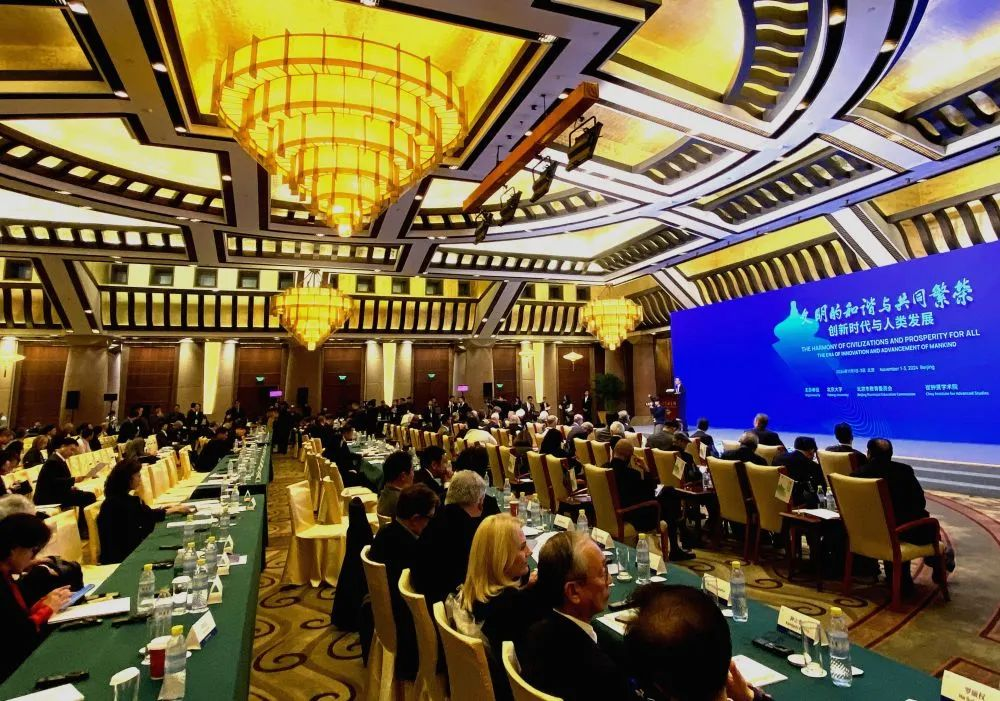
Opening Ceremony of the Beijing Forum
(Photo by Wei Mengjia from Xinhua News Agency)
“Currently, transformation unseen in a century is accelerating across the world, and human society is confronted with numerous global challenges. We are committed to closely following and actively addressing these critical challenges facing humanity through cooperation. Through sustained efforts, we aim to contribute our expertise to resolving these issues, promoting economic and social development, safeguarding world peace, and protecting our shared home, Earth.”
On the afternoon of November 1, the opening ceremony of the Beijing Forum 2024 brought together domestic and international guests from political, educational, scientific, and business communities. They jointly made a solemn commitment.
Promoting mutual learning among civilizations, exploring innovative development, and jointly pursuing prosperity of civilizations are the core objectives of this forum. This international academic forum was founded in 2004 by Peking University and other institutions, dedicated to deepening research on major global issues and contributing to the common progress of human civilization. Over the past 20 years, more than 7,000 experts and scholars from over 80 countries and regions have contributed their insights on global issues, centering on “The Harmony of Civilizations and Prosperity for All”.
Themed “The Era of Innovation and Advancement of Mankind”, this year’s forum comprises an opening ceremony, ten panels, thematic forums, and overseas forums. During the three-day event, more than 500 experts and scholars from over 30 countries and regions engaged in discussions on various topics, such as sustainable development and environmental health, global economic transformation and China’s innovation-driven growth, as well as multidisciplinary integration in the era of artificial intelligence (AI). Consensus was reached to promote development through cooperation.
“Currently, technology is advancing rapidly, with new ideas and technologies emerging one after another. This not only triggers significant adjustments in industrial structures and profound transformations in social structures, but also poses new challenges to the international order and the progress of human civilization.” At the opening ceremony, Gong Qihuang, President of Peking University and Member of the Chinese Academy of Sciences, stated that universities, as important hubs for talent cultivation, significant birthplaces of technological innovation, and vital platforms for the inheritance and mutual learning of civilizations, should take on greater responsibilities.
Romano Prodi, Former Prime Minister of Italy, said that the current world is fraught with uncertainties and globalization is facing challenges. Countries still need to make greater efforts in advancing globalization, particularly by utilizing advanced technologies such as AI to strengthen international cooperation in areas like environment and medicine, fostering common development for mankind.
“I firmly believe that innovation, especially innovation led by businesses, plays a crucial role in addressing global challenges,” Chey Jae-won, Vice Chairman of SK Group, stated in his video speech. He believes that China is at the forefront of innovation, and its investments over the years in biotechnology, electric vehicles, renewable energy sources, as well as other technological advancements, have significant global implications.
During the keynote speech session, renowned scholars presented their achievements and shared insights on scientific and humanities research. Speakers included Gérard Albert Mourou, 2018 Nobel Laureate in Physics and Foreign Member of the Chinese Academy of Sciences, Yan Nieng, Founding President of the Shenzhen Medical Academy of Research and Translation and Member of the Chinese Academy of Sciences, and Wang Bo, Vice President of Peking University.
Philosophical wisdom inspired minds, while cutting-edge scientific discoveries broadened horizons. The exchange of academic ideas by experts from home and abroad captivated the audience, triggering bursts of applause and laughter.
Mourou, who joined the School of Physics at Peking University as Chair Professor this October, gave a detailed presentation on his research in laser science. He stated that over the past few decades, China’s technological development has progressed rapidly with remarkable achievements, and he has been impressed by the innovation abilities of Chinese students.
In his speech, Jim McDonald GBE, Principal of University of Strathclyde and Foreign Member of Chinese Academy of Sciences, elaborated on the severe challenges faced by various countries in addressing climate change and cutting carbon emissions. He believes that international cooperation and innovation in research and education are crucial for addressing global challenges.
“We still need to work together to adjust and optimize the energy mix and vigorously promote carbon emission reduction by applying systematic thinking and methods, with the goal of addressing global challenges,” said McDonald.


